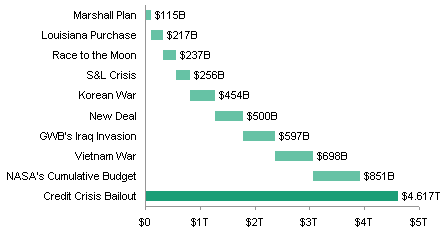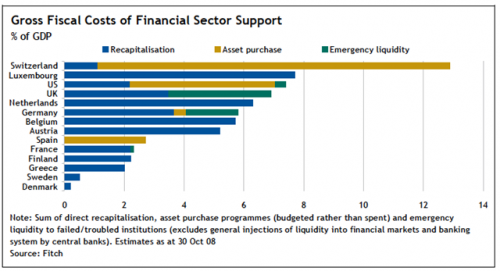Sizing the Bailout

I haven't checked these numbers, and they are supposed to be all in real dollars, but YMMV.
So we are going to spend 33% of GDP to avoid a recesion, when the worst recession in history (the Great Depression) had a peak-to-trough GDP loss of about 20%.
Update: This chart is obviously based on a lower estimate. But it does give one pause when considering the "bailout all due to US laissez faire."

Re: Denmark & Sweden spending very little on financial sector support
While they are no Hong Kong's, the Scandinavian states are free-market economies that just happen to have large (individual, as opposed to corporate) welfare states.
http://www.cato.org/pub_display.php?pub_id=8765
Does the NASA cumulative budget include the moon race? If it does, then the moon race is counted twice; if not, then the $851B figure is not "cumulative".
Canada is not even on the list. For a long time we Canadians have endured smug comments about our socialist society and odious comparisons with free enterprise USA.
Our banking system is the world's most stable and needed no bailouts. With a stroke of a few pens the USA became the largest socialist spender on earth.
How do ya like them Molsons, ya hosers?
The question is: are we really "spending" all that money, or is there some magic whereby much of it comes back? If we are spending it, where is it coming from?
Although I recognize that the "bailout" is big, I believe that most people are being misled by discussion of what is being "spent." Very little money is being spent so far; most of these trillions are loans (or stock purchase) and a little is for guarantees. But essentially any money spent is for administrative costs. Whether the loans will be repaid is open for debate, but the government has typically put itself in very good positions to be repaid.
On the other hand, stimulus packages and other programs is money spent.
Money for the bailout has essentially come from selling US Treasuries. There is a lot of money out there in the world, and -- somewhat amazing -- the entities with this money are willing to buy US Treasuries at a very low return.
"There is a lot of money out there in the world, and — somewhat amazing — the entities with this money are willing to buy US Treasuries at a very low return."
IMO, its just paper.. or 1's and 0's in a computer. It means nothing. Knowledge/wisdom, work/production, and people/health is what matters. It all leads to creativity and innovation... new ideas. A better life according to Maslow's heirarchial needs. I consider it their investment to boost themselves to become self sufficient in those areas. Giving up paper for the means is a great trade. When we have knowledge we can recognize innovation. When we produce, we practice and discover new innovation. When we have our health we have the means to implement the innovation.
This is what has set the U.S. apart from other countries, and consequently what makes humans a dominate species. Many countries have copied the U.S. innovations and sometimes with better results. But in the end, those things mentioned, create wealth. Money just makes transfering it easier and they want it transfered to them.
YIPES!